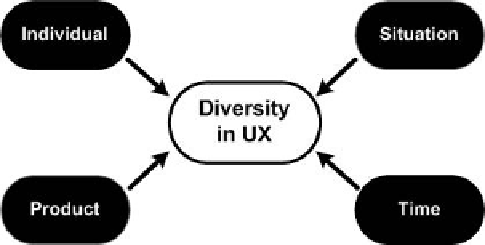Information Technology Reference
In-Depth Information
Fig. 1.2
Four different sources of diversity in user experience. These are assumed to modu-
late the dominance of different product qualities on users' experience and overall evaluative
judgments.
approaches in user experience research, it discusses the limitations of each approach,
and argues for a hybrid methodological paradigm that shares values from both ap-
proaches, the holistic and the reductionist.
1.4
Methodological Issues in Accounting for Diversity
Reductionist approaches typically employ psychometric scales (e.g. Likert, 1932;
Osgood et al., 1957) in measuring latent psychological constructs that the re-
searchers consider as relevant for a certain context. Such approaches are grounded
on the assumption that people may summarize experiences in overall evaluative
judgments (Hassenzahl, 2008). When a product is associated with a certain experi-
ence, the value of the experience will be partially attributed to the product.
Proponents of the holistic paradigm criticize reductionist approaches for not cap-
turing “grey areas and moment-by-moment decision making” (Wright and Blythe,
2007). Instead, they propose holistic and situated techniques that are motivated by
the need to establish an empathic relation with the user (see Wright and McCarthy,
2008). In one of the most popular techniques, the
cultural probes
(Gaver et al.,
1999), participants are typically provided with a camera and a set of abstract ob-
jects to inspire them in capturing their experiences, dreams and aspirations related
to a given topic of interest. Suri (2002) proposed the elicitation of short essays,
i.e.
experience narratives
, in understanding the frustration and enjoyment that is
experienced while interacting with products. Blythe et al. (2002) proposed a tech-
nique called
technology biographies
in which participants are asked to reminisce
how their relationship with technology has changed through their lives. In the cre-
ation of
Anticipation and reflection interviews
, (Blythe et al., 2006) acknowledge
that experience is not limited to a given interaction instance but extend to the pro-
cess of forming expectations of and reflecting on experiential episodes.
One might argue that these two approaches have distinct goals, being
evaluative
or
inspirational
. In this sense, holistic approaches to evaluation serve to inspire de-
sign solutions (Hassenzahl, 2008); evaluation is here understood as idea generation











Search WWH ::

Custom Search